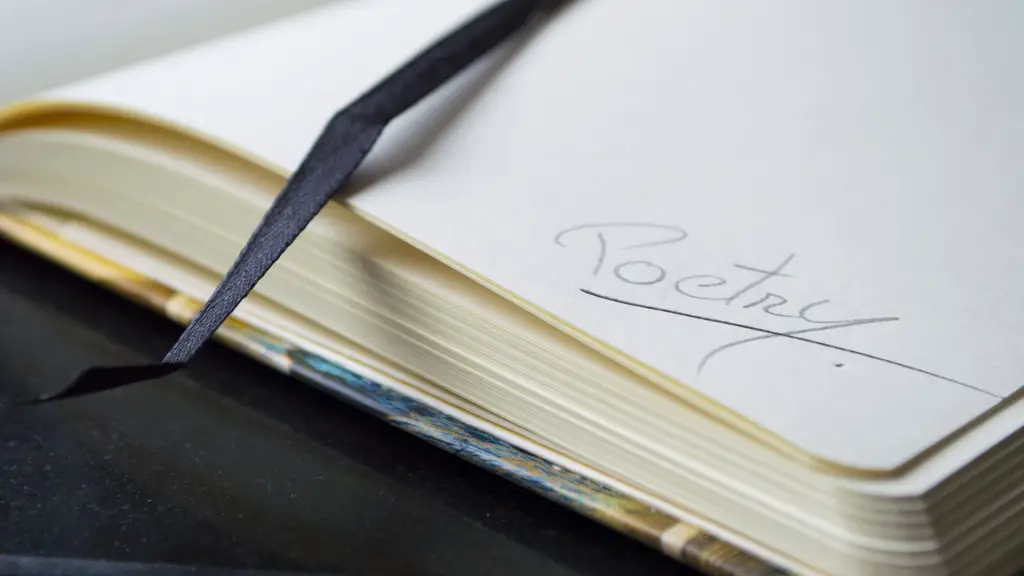Benefits of Poetry Interpretation
Interpreting a poem is often seen as an immense task and one that is daunting because it involves a deep analysis of language and understanding of the poem’s message and purpose. While this can be difficult at first, this skill can become extremely rewarding over time and open up our eyes to the depths of literature. Reading and interpreting poetry allows us to gain invaluable insight into the mindset of the author, their writing style and the emotions that they were expressing. It is a powerful tool and one that can be used to transport our minds to other realms and explore both familiar and new areas of literature.
The Process of Interpretation
Interpreting poetry is often seen as a challenging endeavor and it does require a certain level of dedication and focus. Regardless, the process of interpretation can be broken down into several steps and, once a person becomes accustomed to the mechanics of it all, interpretation becomes an easier discipline. Firstly, it is important to read the poem several times and make sure to pay close attention to detail. Analyzing and understanding the poem’s form is also essential. This means looking at the poem’s rhythm and structure, as well as its rhetorical devices and literary terms. After you’ve familiarized yourself with the poem, you can delve into the meaning of its words and concepts.
Analyzing Symbols and Context
Symbolism used in a poem is often key to understanding the poem’s message, so you must recognize any symbolic elements that the author might be implying. There could also be coded messages or allegories. It is also important to take into account the context in which the poem was written. Consider the setting and background knowledge related to the poem, its genre, as well as its author or any other factors that could influence its meaning. Additionally, you should decode any imagery that may be present. Imagery can often imbue a poem with powerful meaning.
Exploring Emotional Content
When deciphering the message of a poem, it is important to recognize the emotions and feelings conveyed in the poem. Consider the tone of the poem and pay attention to any mood evoked. This can be explored through the poem’s use of language, sound, imagery and symbols. Lastly, you must take a step back and reflect on the poem’s central ideas. Draw together the elements already discussed and decipher what the poem might be implying.
Writing About the Poem
Once you’ve understood the author’s message and its impact, you can go ahead and write about it. Beginning with an introduction, state the poem’s title, poet, and central theme. You can then analyze the poem’s form in terms of structure and rhythm, as well as its words and imagery. Offer evidence to back up your interpretations and consider the context surrounding the poem in terms of its background, most importantly the emotions expressed by the author. Move onto explaining the poem’s impact, its message and its implications. Tie it all together with a conclusion, in which you answer the ‘so what?’ question that arose during your analysis.
Making Connections
When interpreting a poem, it is important to make connections. Connection between the poem’s language and its context, or between the poem and the reader himself. It is important to ask questions, whether in terms of the poem’s form or its meaning, as this furthers the understanding of the poem and accelerates the process of interpretation. Poems may also contain links to external sources such as other poems, so be sure to explore these and see how the poem’s meaning may be affected.
Learning to Love Poetry
Whilst sometimes undertaking the difficult process of interpreting poetry can be overwhelming, once a person acquaints themselves with its language and meaning, they can come to appreciate the poem differently. It is important to remember that poetry has the power to evoke emotion. It is more than just words on a page, but rather an experience to be enjoyed; a way to explore further into literature and uncover hidden gems. With enough dedication and practice, interpretation of poetry can become a rewarding and enriching experience.
Exploring Themes
Themes are one of the most important aspects of poetry, as they are often used to guide the reader through a poem and influence the poem’s meaning. A poem’s themes often reflect the author’s own beliefs and point of view, so by exploring these you can gain a better insight into their thoughts and feelings. Similarly, the poet may be exploring and expressing a certain theme, such as love, anxiety, religion or death. By taking note of the poem’s stated and implied themes, the reader can traverse down a deeper path of analysis and truly appreciate the poem.
Discussing Poems With Others
Interpreting poetry can be enriched and further gotten into depth by discussing them with others. This dialogue can offer differing perspectives on the poem and could open up areas of exploration that were unknown beforehand. It incentivizes the reader to dig further and find out more on the poem and literature in general. This process allows discussion, disagreement and, most importantly, a great deal of learning from one another.
Using Poetry To Learn About Yourself
Interpreting poetry can bring about a deeper level of understanding for yourself and offer you a powerful emotional tool. This emotional insight can help us to confront personal issues, combat emotional problems, and allow us to explore new areas of thought. By analyzing poems, we can identify our own triggers, gain empathy and understanding and find out more on what we deem is important. In this way, a poem’s message can be used to help us to learn more about ourselves and open us up to experience.
Conclusion and Reflection Through Poetry
Interpreting poetry is an essential process and learning how to engage in it can help us to become better critical thinkers, provide us with emotional awareness and grow into much more emotionally mature individuals. Whilst it can be difficult at first, over time it becomes a procedure that is both stimulating and rewarding. Not only does it offer us an insight into the poet’s mind and what they’re trying to express, but it also gives us the chance to gain an insight into ourselves, bridge cultural divides and challenge existing ideas and theories. Thus, poetry is not only a tool for expression, but for education, understanding and exploration.


